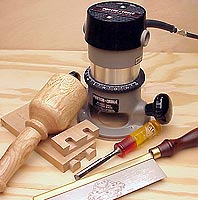This is a Veteran Owned site
| |
||
Woodworking Techniques and ProceduresYour opinion is the one that countsText and photos by Tom Hintz One of the intriguing aspects of woodworking is the diversity of technique that can be applied to virtually any project. This range of choice can also be confusing for new woodworkers who are trying to identify techniques that apply to the projects they have in mind, and with which they can be successful. Not long ago a new woodworker emailed me, confused over how he should be cutting dovetail joints. He was interested in using a router and had sought advice on a woodworking forum about the various dovetail jigs on the market. Along with several reasoned jig recommendations came a few responses implying that hand cutting dovetails was "the right way." The exchange left him wondering if he might be shortchanging himself or his projects by following his original interest of using a router and dovetail jig. Unfortunately, this is not an uncommon occurrence. Woodworking is a huge hobby, with the number of active participants estimated by some within the industry at between seven and eleven million strong. Each brings their own set of capabilities and interests that often make specific techniques more applicable in their situation. As long as the techniques chosen are safe, and produce the desired results, they are right for them. Tradition is a major inspiration for many of those who pursue the use of hand tools and techniques. Some use tradition as justification for recommending a new woodworker learn these time-honored techniques before using machinery. I had a devout hand-cut dovetailer tell me that before routers, everyone cut dovetails by hand, with spectacular results. Of course, that is absolutely true. However, does that mean that all of those craftsmen would have shunned electric routers had they been available? We must remember that the woodworkers of yesterday worked hard at developing powered machinery to make their craft more accurate, efficient and to increase productivity. Harnessing water and steam power were exceptionally difficult undertakings, but their use was widespread nonetheless. The attraction of what were then state-of-the-art power tools apparently justified the effort required to use them. Judging by the number of power tool manufacturers in business today, that attraction has not diminished. As the technology of power and machinery advanced, so did the tools used by woodworkers of all descriptions. I suspect that if we could go back in time to introduce electricity and power tools, the woodworkers of yesteryear would be just as enthusiastic as their counterparts today. This is not to say there is anything wrong with learning and applying time-honored techniques and tools. Hand cutting dovetails is an art that is obviously very rewarding to a large number of woodworkers who enjoy using the old-style tools and techniques, and produce beautiful projects with them. The problem is when someone implies using modern tools and techniques somehow diminishes the quality or sentimental worth of someone else's project. We have to understand that within the millions of woodworkers, some will find using hand tools intriguing. For others, those same hand-operations are of little interest. It is also true that some with a hand tool aversion early in their woodworking lives will develop an interest in their use later. The choice has to be made by the individual, hopefully with solid, unbiased advice. Hand tools and techniques frequently require considerable learning and practice time, a commodity many of today's new woodworkers have in about the same quantity as free walnut. For many of us, career and family obligations must be satisfied before going to the shop, or there may be no shop. These constraints influence choices regarding techniques and tools are used today, and those to be explored in the future. Some will choose hand tools now and power tools later, some reverse the order, and still others stay with one or the other. None of them is wrong. Some veteran woodworkers can be rather evangelistic in their offering of advice to new woodworkers. If that passion strays beyond reason, it can taint otherwise sound advice, particularly when offered to someone new to the hobby. Veteran woodworkers have to remember how easy it is for those new to the hobby to misunderstand advice. Educational offerings about another facet of woodworking is useful; implying one way is more "right" than another is not. Unless the new woodworker is considering a technique known to be dangerous, they are better served by unbiased insight pertinent to the technique in which they are interested. Whether through Internet forums, classes or spontaneous conversation, experienced woodworkers have the opportunity to make learning the hobby easier for those just beginning. New woodworkers should listen to the advice, but remember that the most important opinion is their own. The primary concern in woodworking must always be safety. Whatever techniques or tools you choose, learn to use them correctly. This is another area in which veteran woodworkers can help novices avoid injury while getting the best results from whatever tools they may be using. Veterans are aware of the seemingly innocent procedures that can easily turn into an injury. There is a style of woodworking, using tools you like, that will fit nearly any interest and shop. Listen to all the advice you can, and then consider how those ideas fit your situation, current (and future) shop capabilities, and the kind of projects you want to build. Your interests in woodworking tend to expand naturally as basic skills are learned, opening the door to others, and so it goes. Do you have a comment about this page? - Email Me!
|
All written, photographic and drawn materials are property of and copyright by NewWoodworker.com LLC 2000-2019. Materials may not be used in any way without the written permission of the owner.

